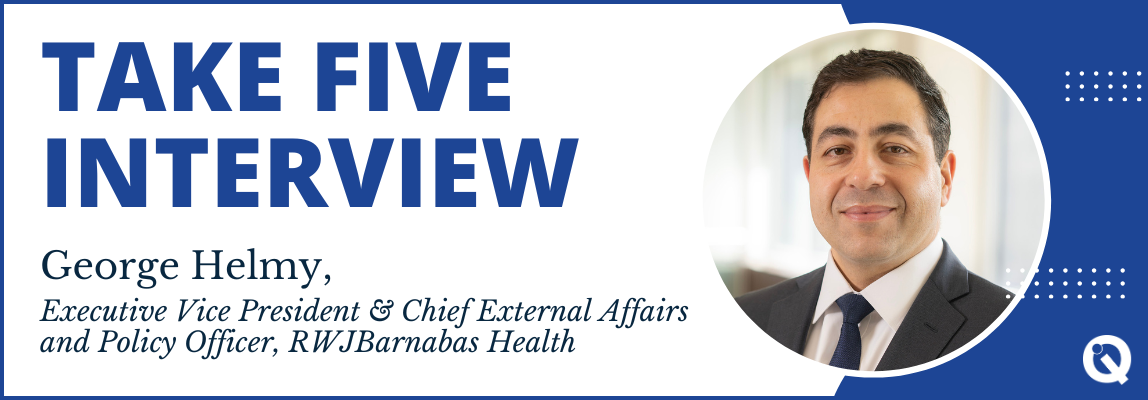George Helmy, Executive Vice President, Chief External Affairs and Policy Officer of RWJBarnabas Health, a member of the Quality Institute’s Leadership Council.
You worked as State Director to U.S. Senator Cory Booker, and were appointed by Governor Phil Murphy to briefly fill the U.S. Senate seat vacated by Senator Bob Menendez. What lessons did you learn in those roles that inform your work today in health care?
I had already spent about seven years as a Senate staffer, so I knew the institution well. But what serving in the Senate, even briefly, reinforced for me — especially in the context of health care and socioeconomic challenges — is that the issues we face in New Jersey aren’t all that different from those in red or blue states across the country. At the core, people everywhere want access to affordable, high-quality health care.
Despite the polarization in Washington, there is real opportunity for bipartisan collaboration. We’re in the relationship business. If we take time to talk to colleagues across the aisle — people we might only agree with 20 percent of the time — we can still work together on meaningful policies that improve people’s lives.
In just three months, I built relationships with about 30 to 35 senators, including some very conservative Republicans. I think there’s a quiet hunger in D.C. for more deliberative, civil dialogue — something that’s often overshadowed by political theater and media soundbites. I’d approach people and say, “I heard your remarks on the floor — can we talk about that?” And more often than not, they were open to it. That kind of exchange is powerful. It’s not the norm, but it should be.
After returning to the health care sector, what is your one top priority at RWJBarnabas Health?
For me, the driving priority is community health. That’s why I joined the health system, because of their deep commitment to investing in the well-being of the communities we serve. Whether it’s working with community and government partners to address homelessness, food insecurity, or our investments in Federally Qualified Health Centers, we’re putting tens of millions of dollars into initiatives designed to keep people healthy and out of our emergency departments.
RWJBarnabas Health is deeply rooted in and is part of the fabric of cities like Elizabeth, Newark, New Brunswick and Jersey City. We are by far the largest provider of charity care in the state — double the next system. When we talk about community health, it’s not just a talking point. It’s a real financial and strategic commitment.
My top priority is to ensure we continue making these investments. But I must acknowledge that looming federal cuts to Medicaid funding pose a serious threat to this work. If those cuts become a reality, we’ll be forced to make very difficult decisions that could undermine the progress we’ve made in these communities.
Following up on that, if major federal Medicaid cuts do happen, what will be the biggest challenges for hospitals?
Based on projections from New Jersey’s Department of Human Services, we could be looking at billions of dollars in lost federal support. That would have a profound impact on our ability to deliver care and invest in the social determinants of health.
The first challenge is continuity of care. Many of our programs are designed to make people healthier and reduce their need for emergency care — which ultimately saves the system money. But if we lose the funding that supports those initiatives, we can’t sustain them. That creates a vicious cycle: sicker communities, more hospital visits, higher long-term costs.
Second, people will lose coverage. And let’s not forget, reimbursement rates for federal programs like Medicaid haven’t kept pace with the rising costs of care. Hospitals will be getting hit from both ends — serving more uninsured patients while receiving less reimbursement for the care we do provide.
You simply can’t say you’re committed to building healthier communities while simultaneously slashing the resources we need to deliver food, education, housing assistance, and preventive care. That’s a recipe for worse outcomes and deeper inequities.
How will the proposed federal cuts impact RWJBarnabas Health’s partnerships with Rutgers Health and other collaborators?
The ripple effects would be significant. At a high level, fewer resources to health care providers means we’ll be forced to scale back services, capital investments, and — most importantly — our community investments.
Specifically, regarding our partnership with Rutgers Health, cuts to National Institutes of Health funding and reductions in research support would be devastating. Rutgers has worked hard to become a leader in innovation and medical research. These programs don’t just drive new cures and treatments —they generate economic growth and jobs. Undermining them threatens both the long-term health of our communities and the economic vitality of our region.
Our collaboration with Rutgers is about more than medicine. It’s about improving health outcomes while also driving innovation, workforce development, and education. The federal cuts put all of that at risk.
Finally, beyond your professional life, can you share an experience that shaped who you are today?
It’s the totality of my upbringing. I’m the son of Arab immigrants who left Egypt — a country they loved— in pursuit of opportunity. That kind of sacrifice creates a powerful sense of gratitude and responsibility.
Growing up, my father often reminded us how fortunate we were to live in America. He would talk about how people here could aspire to roles in government and public life — something that wasn’t always possible where he came from. He didn’t push us into public service, but he instilled in us an ethos of giving back. Both my brother and I were drawn to that mission.
It’s what led me to public service and, later, to health care. I believe in the greatness of this country — but I also believe that greatness depends on our willingness to serve, to invest in others, and to leave things better than we found them.

